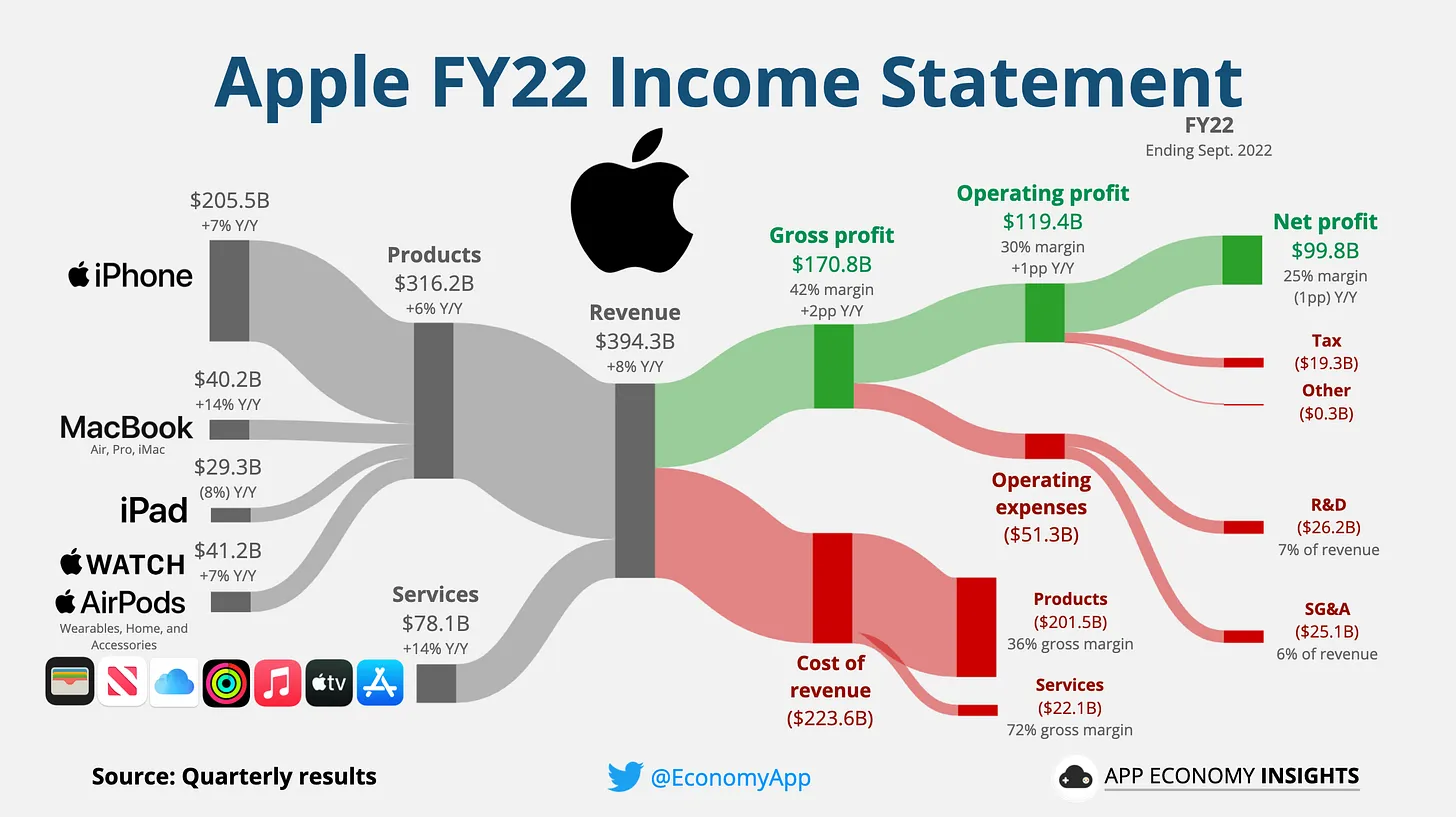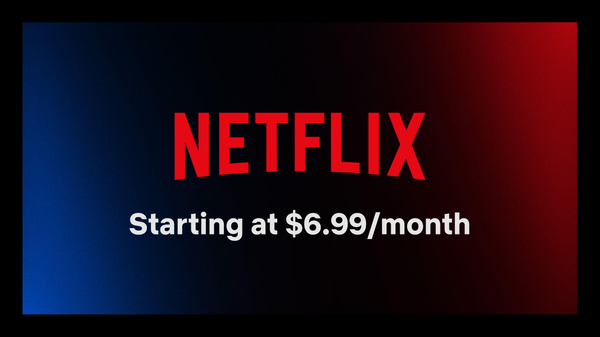Apple is building an Ad (Services) Empire
The highlight for me during the entire earnings call was that Services now account for 33% of Apple’s gross profit and the fastest-growing segment in FY22 - up 14% YoY.
It’s earnings week and so far the news hasn’t been great. However, Apple of all the tech companies has had a decent result in an otherwise terrible week for across all tech companies (so far). It’s impossible to look at Apple’s performance in a vacuum.

The highlight for me during the entire earnings call was that Services now account for 33% of Apple’s gross profit and the fastest-growing segment in FY22 - up 14% YoY.
I remember hearing Apple is doomed when iPhone used to dominate its gross profit pie. That pie has been shrinking and all eyes are on the services sector.
Keep in mind this segment grew 26% YoY last year.

Now, Apple does not give us a breakdown on its services revenue and during this call didn’t disclose anything about its advertising revenue either. When asked during the earnings call, Tim Cook simply said it was “not large”. I simply recon for how long though?
Ekaterina Kachalova on Industry News:
Apple has always styled itself as a paragon of privacy whose profits are not ad-driven. “You are not our product. You are our customer. You are a jewel, and we care about the user experience,” Apple CEO Tim Cook famously said in 2018.
Apple continues to keep privacy in mind. Their push agains third party tracking simply makes it harder to pull personal data from applications.
And unlike most of its high-profile competitors, Apple seemed to be walking the talk. While Apple’s ad revenue is expected to reach $5 billion this year, it pales in comparison to the ad money Google and Facebook are making. Google earned a staggering $209bn from ads alone last year and Meta crossed the $100bn threshold for the first time, raking in $115bn.
$5 billion is about a quarter of their entire services revenue. In comparison to the money Apple makes, it may not be “large” but Apple is positioned itself to take that number even higher.
Those figures could be even higher had Apple not launched a sweeping crackdown on tracking last year. Its new privacy feature, known as App Tracking Transparency (“ATT”), required apps to seek users’ permission to track them across other applications and websites, thus making it easier than ever for users to opt out of tracking and personalized advertising — which they overwhelmingly did. Only about 25% of iOS users worldwide now explicitly let apps to track them.
Apple’s push against third party tracking is causing major problems for Meta and Google.
Apple dealt a blow to the ability of third-party platforms to pull personal data from apps. That data is crucial to targeted advertising which Facebook relies on as its prime source of revenue. Highly personalized ads pay off way more than ads based on a random or less precise set of data, so Facebook is losing money — Apple’s anti-tracking feature is projected to cost Meta $12.8 billion this year.
Meta already has enough personal information which they can use to show ads, but its the extra metadata it gets from the app that allows them to curate this even further. I have spoken to several small business owners who have seen the benefits of facebook ads working for them.
A $12.8 billion hit is just this year but pretty sure there is more to come.
New entrants in the market could also challenge Meta and Google. Apple plans to show ads in their maps starting next year (similar to Google). Digital search is evolving across TikTok, Amazon and Instagram. When you are looking for product you turn to Amazon - that trend has been in effect for some time now.
However, according to this New York Times article TikTok and Instagram is the new search engine for Gen Z:
“In our studies, something like almost 40 percent of young people, when they’re looking for a place for lunch, they don’t go to Google Maps or Search. They go to TikTok or Instagram.”
Just when you thought at least influencers on these platforms will be spared, Apple’s new App Store tax on ads can cause some problems for these platforms as well as influencers.
Meta’s biggest advertisers won’t feel Apple’s latest squeeze. It will be the individuals who buy one-off boosts in Instagram and Facebook that are affected the most since they’ll have to pay more for the same level of distribution, according to Eric Seufert, a respected ad industry analyst. “By inserting itself into the social media post boosting process and extracting a 30 percent fee, Apple is reducing the effectiveness of advertising spend for small businesses and influencers.”
More scoop on the latest Apple Store Tax on 9to5Mac.
To summarize, keep an eye out for the next few earnings call where you will see the Services pie growing ever so slightly. It won’t take long when the services revenue surpasses the iPhone and becomes the biggest pie.
Apple understands this space very well now after observing it for so many years. And just like the other features they have perfected in the past, they will roll out their ad platform successfully.
Recently Elon Musk published an open letter to Twitter’s advertisers:
Dear Twitter Advertisers pic.twitter.com/GMwHmInPAS
— Elon Musk (@elonmusk) October 27, 2022
I highlight and mention this again:
I also very much believe that advertising, when done right, can delight, entertain and inform you; it can show you a service or product or medical treatment that you never knew existed, but is right for you. For this to be true, it is essential to show Twitter users advertising that is as relevant as possible to their needs. Low relevancy ads are spam, but highly relevant ads are actually content! Fundamentally, Twitter aspires to be the most respected advertising platform in the world that strengthens your brand and grows your enterprise.
I don’t think we as consumers have a problem with ads. We have seen so much advertisement all around that at this point we just want them to be desirable.
More to follow.





